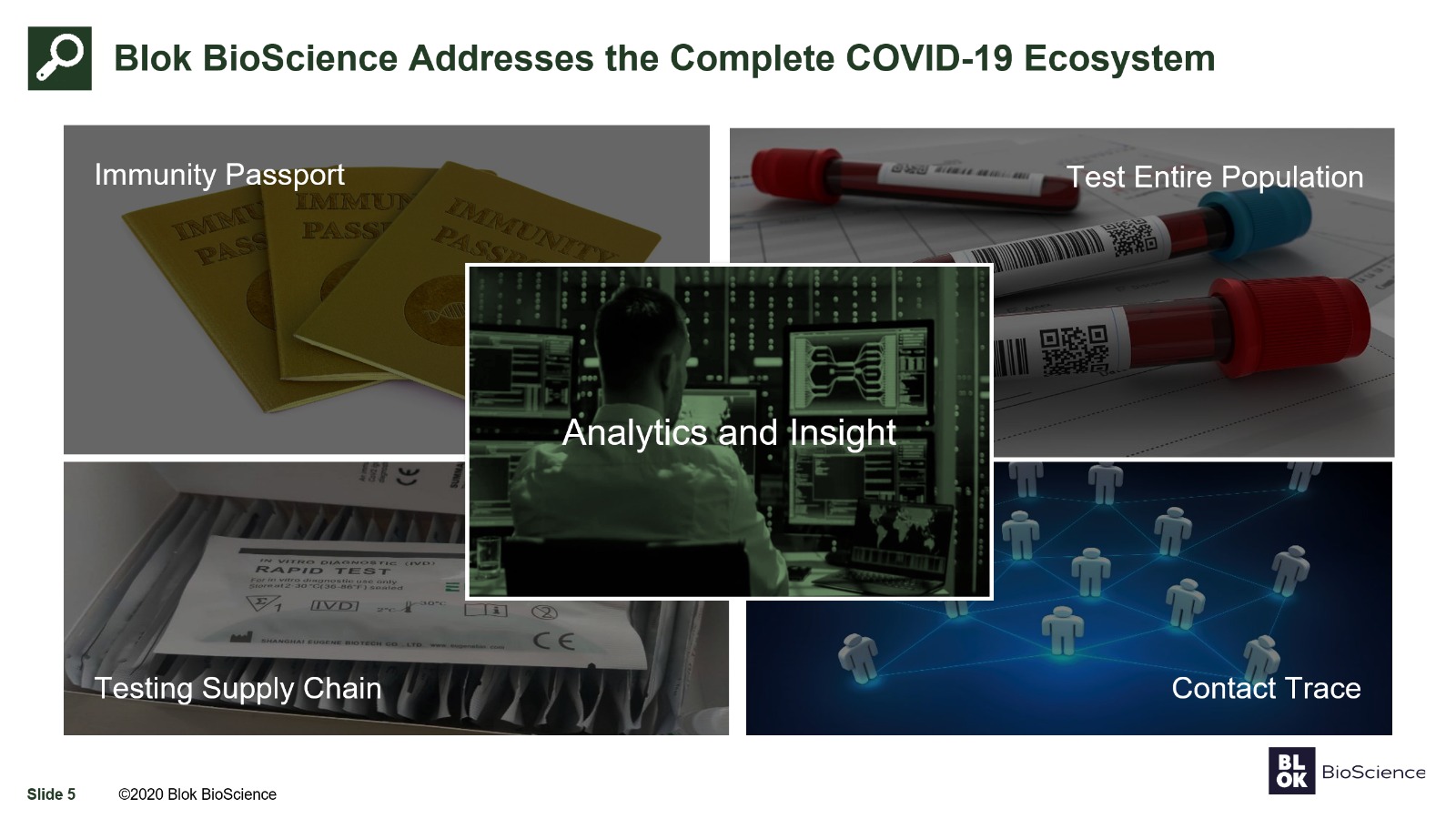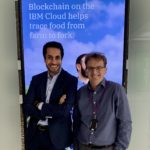
Areiel Wolanow is the CTO of Blok BioScience and Managing Director of Finserv Experts. In this podcast we get to learn about the exciting work Areiel and his team are doing in developing end to end solutions against COVID-19. You’ll hear insights about how they developed a self-sovereign “immunity passport”, population testing protocols, supply chain capabilities, and a sophisticated analytical and insights dashboard for governments and enterprises to better appreciate and combat this pandemic. You’ll also hear about the conundrum on how to work with contact and trace applications in a manner that protects the principles of self-sovereignty.
What is blockchain?
Blockchain is a technology that allows multiple companies or people to share a single version of the truth without having to spend any time, effort or money on reconciliation, messaging and synchronization to name a few. The benefit from sharing allows the opportunity for completely new business models and new ways of solving problems to arise.
Areiel, previously featured on Insureblocks to talk to us about “Unlocking investment in blockchain projects”. What has changed in his view regarding blockchain is a very welcome maturation of thought. It is a toolkit for solving problems and for accomplishing what previously what would have taken large numbers of people, or expensive software solutions can now be taken for granted.
What is Blok BioScience?
Blok BioScience is a team of thought leaders in the medical, technology and supply chain industry who’ve grouped together to develop rapid solutions that deliver the best possible medical diagnostic and supply chain capability to fight the unprecedented impact COVID-19 is having on the world. Areiel’s Finserv Experts have entered into a business partnership with Blok to provide technology delivery capability.
Addressing the COVID-19 Ecosystem
The scientific community does not use words like immunity or protection lightly or without a great deal of consideration. When somebody says this vaccine confers immunity to this disease, they are encapsulating and summarizing, in most cases years of scientific study before they’re willing to make that claim. When the WHO (World Health Organisation) recently came out and said we’re not sure that the IgG (Immunoglobulin G) antibody is a marker of immunity, all that they’re saying is that they have not subjected that claim to a level of scientific rigor that would allow them to say yes, the IgG antibody confers immunity.
As the world’s economy has come to a standstill the world is demanding answers of the scientific community far faster than they are normally required to give those answers. And that results in a great deal of uncertainty.
Providing an answer needs to address all of these questions in a holistic way and provide not only say a test capability or a set of scientific studies, or a technical platform, but a holistic end to end solution that encapsulates all of that. And that’s really the ambition that Blok was set up to tackle.
Immunity passports
The WHO issued a warning about immunity passports:
This warning is entirely correct. Just because you have an attested digital or even paper certification that says you have this antibody does not necessarily mean you’re immune to anything. It means you have the antibody via an attested record.
For Areiel what is critical is that the data that is contained in an immunity passport belongs to the individual who had the test. It should not belong to the government, it should not belong to the person’s medical insurer, or their employer. Now, that creates a little bit of a conundrum because employers need to understand their employee’s medical status in order to determine whether it’s safe for them to return to work.
But by current law, an employer can’t ask an employee detailed health questions. How do you square that circle? How do you provide employers a way to get people back to work without breaching data privacy, and the principle that people should own their data?
The main purpose of the immunity passport is to provide the individual with an attested record of their antibody test and symptom status that employers, governments and transportation networks can use in a way that doesn’t compromise the self-sovereignty of that person’s data.
Areiel recognises that there are a number of major efforts around self-sovereignty but none of them have emerged as a standard. Recognising that a solution needs to be delivered very rapidly, Areiel and his team had to build a solution that infers self-sovereignty in a rock solid manner. They achieved this by keeping all of an individual’s data on their mobile device.
Areiel walked us through how his immunity passport app works:
“If you were downloading the immunity passport app onto your phone. In the onboarding process, you would do several things. You would take a picture of an ID that was valid in the country that you lived in, you would take a selfie using the app, you could not choose a picture from your photo library, you had to take a selfie live using the app, and you would give us consent to store that data on your app.
You then go through an attestation process where you would confer with or meet with a designated agent of the government or the enterprise that you have the immunity passport, or that was using it. And you would show an agent of that governmental enterprise, the selfie that you took on your phone, your physical ID that you took a picture of, and the picture on the phone, the agent would look at all four of those things, your selfie, your physical ID and the photo of your ID, and verify that all four of those things were the same. The agent would then indicate on their app that you are now attested.”
At no point during this process or the share of information is the attested person’s name recorded or shared.
The self-sovereignty is protected in the following way:
- The fact that the name is never recorded on any database.
- The physical evidence, that picture of the passport never leaves the phone, there’s no API that allows anybody to query it. There’s no database that stores it. And all of the test results are there.
The install of the app on the phone allows Blok a way to communicate back and to give good guidance information that is specific to the individual’s antibody status and symptoms. The way this work is that all guidance information is sent to the phone and the app will determine based on the individual’s antibody status which portion of the guidance is relevant to them.
If that individual needs to go back to work they just need to show their employer, or a government official or a security guard their QR code that will show their status without sharing any personal details.
Likewise, the data about the individual’s medical test and their symptom status is absolutely vital to epidemiologists and for companies to plan when their workforce can come back to work, but they don’t need to know who the individual is to draw those inferences.
Blockchain’s role?
Blockchain is a key delivery accelerator and getting these capabilities live fast.
Blockchain plays a key role in several areas. One is that it provides a level of validation of the test results and in keeping those records secure. Just a few days ago both the US and Britain issued a communique, saying that state sponsored hackers are actively working to penetrate labs, universities, pharmaceutical companies to steal, work that is being done on vaccinations and other COVID-19 fighting measured.
Blockchain allows a way of authorizing the sharing of these results for scientific cooperation, for cooperation between enterprise, trade groups and for cooperation between governments. Doing that in a way that respects the sovereign data residency requirements of one country versus another is critical.
These capabilities aren’t new to blockchain and numerous design patterns have already been implemented to do all of those things. So blockchain is a key delivery accelerator and getting these capabilities live fast.
Testing capability
It’s well understood that the rapid home test kits aren’t accurate enough to be useful for diagnostic purposes. If you’re going to base medical advice to somebody on a test, you need to know that the test is good because you’re taking someone’s life into your hands. So, the threshold for accuracy and specificity of a diagnostic test must be very high, or it’s not useful.
Home tests essentially have three purposes:
- A test that is, say 90% accurate, is still not accurate enough to be of use for diagnostic purpose.
- A test of even 70% of accuracy is still good enough to be of use in epidemiology. For example, wanting to know where in a country or in a large workforce there is an outbreak, a 70% accuracy is quite informative.
- Home tests can identify people who could become serum donors as for now the best way to treat people who are critically ill is with blood serum of people who’ve been through the disease.
The approach to defining a good testing protocol is having a multi-tier strategy. Testing a large segment of a population is useful for making decisions about who gets the more accurate lab tests. Designing good protocol means understanding the strengths and weaknesses and capabilities of each of the various kinds of tests and building a protocol that takes advantage of the best of each.
Supply chain capability
Most of the test capability, the ability to manufacture both the high accuracy lab tests and the scalable rapid tests comes from China. This is true for two reasons:
- Much of the world’s manufacturing capability comes from China
- China was the first country to tackle COVID-19
The world at this point is largely dependent on China for capacity. Blok has a number of good working relationships with Chinese industry. Because of those relationships they are able to source tests from China but also to license the IP of those tests in order to locally source and manufacture the tests here in the UK or in any of the countries that Blok is currently talking with.
That allows for a much more secure and reliable supply chain that is being manufactured and delivered in the country where it’s required. It allows for the logistics to be far simpler.
Contact tracing capability
Areiel points out to the conundrum that is associated with contact trace. On the one hand, it is exactly the sort of capability that many people do not want governments to have, which is to record the movements of its populace. On the other hand, there is incontrovertibly evidence that contact trace capability is of inestimable value in fighting infectious disease, these statements are both true.
Because contract and trace violates Blok’s principles on self-sovereign data they have decided not to build the capability themselves but to provide an integration capability to any of the credible and accepted contract trace solution such as the Apple & Google one, or the ones from Australia and Singapore.
Blok will provide integration capability to those solutions via an encrypted pipe that never touches Blok’s data so that they can retain the full self-sovereignty of their solution.
Analytics & insights
Analytics and insights are key parts of the overall solution. It comes in different versions:
- Operational reporting to monitor the supply chain and the effectiveness of the testing strategy.
- Analytical capability to determine whether or not a workforce is able to return to work by analysing geospatial mapping to identify hotspots.
- Supply chain provenance to identify supply chain bottlenecks and where a batch of inaccurate test kits originated from in order to remove them from the supply.
Once Blok gets sufficient data they can start doing some serious machine learning using a combination of supervised and unsupervised algorithms to actually get a step ahead and accelerate the growth of understanding to drive medical science to say such things such as: How long does the antibody take to confer immunity? How long does that immunity last? How accurate are the test kits in real life instead of in a lab?
Webinar, opportunity to learn more
On the 14th of May 2020 at 18:00 Areiel will run a webinar entitled “How Blockchain is Being Used to Fight Covid-19 and get People Back to Work”
Areiel will walk through how DLT is playing a pivotal role in how enterprises and governments around the world are working to gain control over the Covid-19 pandemic.
Areiel will share the current thinking on what technology can and can’t accomplish, and give valuable insight on how to provide the vital diagnostic and epidemiological data that is needed to effectively fight the virus, while at the same time not giving governments a back door into a national ID scheme or a general surveillance tool that is not part of their disease-fighting mandate.
You can register a place at that webinar here!










